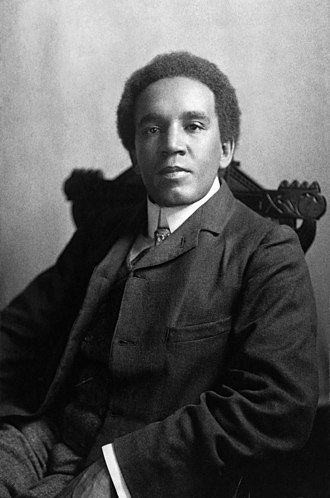Samuel Coleridge-Taylor
Samuel Coleridge-Taylor (born London, 15 August 1875; died Croydon, 1 September 1912) was an English composer.
Coleridge-Taylor died in Holborn, London. His black father was a doctor from Sierra Leone, his mother was English. His parents were not married. The father went back to Africa by February 1875. He had the job of coroner for the British Empire in the Gambia in the late 1890s. He did not know he had a son.
Life
Coleridge-Taylor was brought up in Croydon . He studied the violin at the Royal College of Music and composition with Charles Villiers Stanford. In 1899, he married Jessie Walmisley who had been a student with him at the RCM. Her parents did not want her to be married to someone of mixed race. The couple had a son, Hiawatha (1900-1980) and a daughter, Avril, born Gwendolyn (1903-1998).
Soon Coleridge-Taylor became known as a composer. Edward Elgar helped him get one of his pieces performed at the Three Choirs Festival. Two months later Stanford conducted the cantata Hiawatha’s Wedding Feast, the piece for which he is best remembered. He toured the United States in 1904. This made him even more interested in finding out about his racial heritage. He wanted to do for African music what Johannes Brahms had done for Hungarian music and Antonín Dvořák for Bohemian music. He had met the American poet Paul Laurence Dunbar in London and set some of his poems to music. Several people encouraged him to learn more about his heritage.
Coleridge-Taylor was a shy man, but he was a very good conductor. He was often asked to adjudicate at music festivals.
Coleridge-Taylor was 37 when he died of pneumonia. His widow hardly had any money, but King George V gave her a pension of GB£100, which shows how popular Coleridge-Taylor had been as a composer. A memorial concert was held later in 1912 at the Royal Albert Hall and gathered £300.
Coleridge-Taylor's works were often performed by Sir Malcolm Sargent who conducted ten seasons of a costumed ballet version of Hiawatha at the Royal Albert Hall between 1928 and 1939 with the Royal Choral Society (600 to 800 singers) and 200 dancers.
His music
Coleridge-Taylor's best-known work is his cantata Hiawatha's Wedding-feast, which was performed very often by choral groups in England during his lifetime and for many years after his death. He wrote several other pieces about Hiawatha: The Death of Minnehaha, Overture to The Song of Hiawatha and Hiawatha's Departure.
He also wrote a lot of chamber music, anthems and other works. The orchestral piece Petite Suite de Concert used to be very popular, but its Romanticism sounds a little old-fashioned now.
Samuel Coleridge-Taylor Media
References
The New Grove Dictionary of Music and Musicians, ed Stanley Sadie; ISBN 1-56159-174-2


